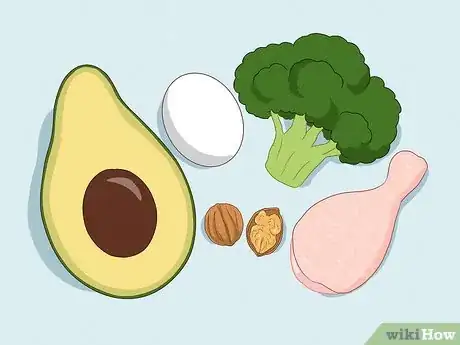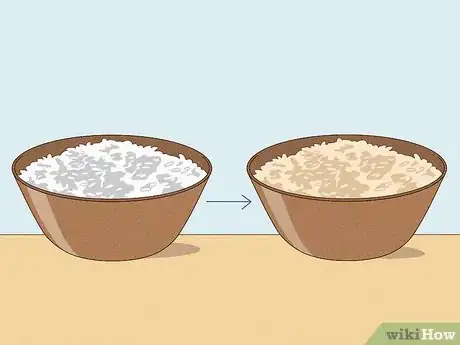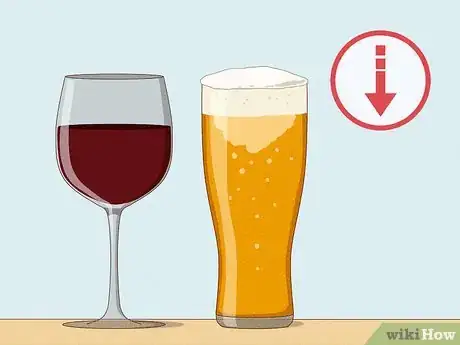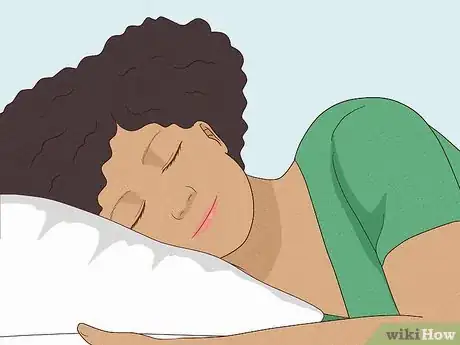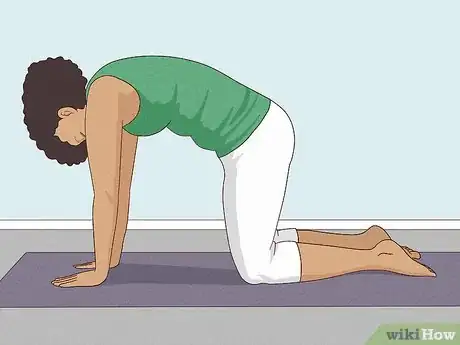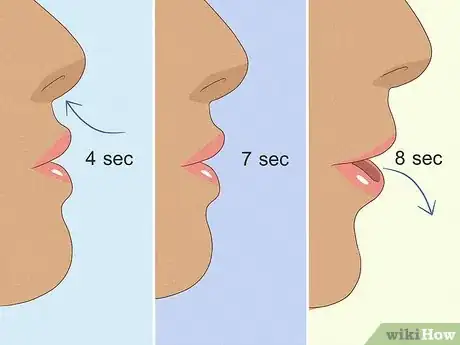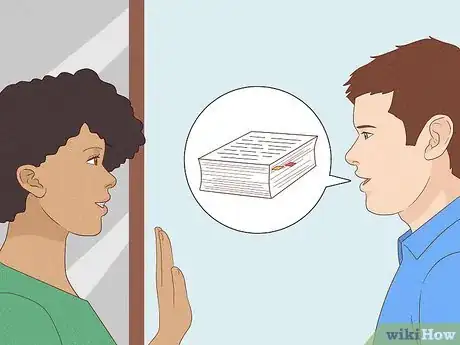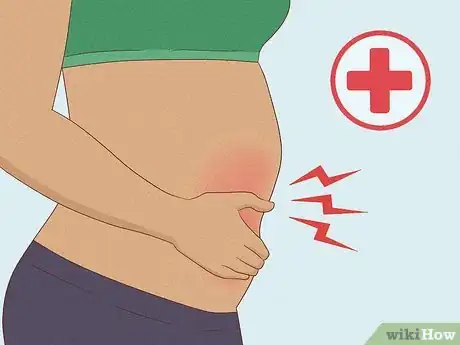This article was co-authored by Laura Flinn and by wikiHow staff writer, Aly Rusciano. Laura Flinn is a National Academy of Sports Medicine (NASM) Certified Personal Trainer, USA Olympic Weightlifting Sports Performance Coach and Certified Fitness Nutritionist, with an additional qualification as a TRX Suspension Trainer. Laura runs her own personal training program based in the San Francisco Bay Area and specializes in topics such as weight loss, muscle growth, cardiovascular training, and strength training.
There are 19 references cited in this article, which can be found at the bottom of the page.
This article has been viewed 23,519 times.
Life is stressful, and sometimes that stress can appear as a little extra weight around your stomach. Stress belly, or an increase in abdominal fat, is most likely not a serious medical condition but a sign that you’re over-stressed.[1] X Research source When you're stressed, cortisol levels rise and your appetite increases. In a prolonged period of stress your body stores cortisol in your stomach as fat as part of its fight-or-flight response. All bodies are beautiful, but we know that the extra weight can have you feeling a bit off, so we’ve compiled a list of ways you can get rid of stress belly.
Steps
Be mindful of what you eat.
-
A balanced, nutritious diet will help you feel amazing inside and out. This doesn’t mean cutting out all the joys of food out of your life. Just being cautious and aware of what and how much you’re eating can help you lose the extra weight. Personal trainer Laura Flinn recommends "limiting your sugar and simple carbs, eating a variety of fresh vegetables and fruits, healthy fats, and lean protein."In addition, adding foods to your diet that reduce stress can also help lower cortisol levels and shrink that stress belly. The next time you go grocery shopping, think about adding these foods to your list:[2] X Trustworthy Source Cleveland Clinic Educational website from one of the world's leading hospitals Go to source
- Foods rich in vitamin B like beef, chicken, and eggs help break down cortisol.
- Foods high in omega-3 fatty acids like avocados, salmon, and walnuts help reduce inflammation.
- Foods rich with magnesium like bananas, broccoli, and spinach can help relax your body and mind.
Eat in a calorie deficit.
-
Safely lowering the number of calories you eat a day can help you get rid of stress belly. When you eat in a calorie deficit, you are eating fewer calories than you’re using. Try swapping out that bag of chips for a large apple, or skipping that morning snack when you’re not hungry. Something as simple as not going back for seconds can help you lower your calories without starving.[3] X Trustworthy Source MedlinePlus Collection of medical information sourced from the US National Library of Medicine Go to source Personal Trainer Laura Flinn explains, "when I work with someone on their weight loss goals, I advise them to aim for 1-2 points a week for healthy weight loss." However, she also emphasizes that everyone loses weight at different rates: "If someone has 50 pounds to lose, they will lose weight faster than someone who has a few pounds to lose. Genetics also play a big role in how much and how fast someone can lose weight."
- If counting calories isn’t safe for you, no worries! You don’t need to track your calories to be mindful. Just think about eating until you're satisfied and only snacking when you need to.
- Don’t rely on food to manage your stress. Instead of reaching for a candy bar, call a friend.[4] X Trustworthy Source Cleveland Clinic Educational website from one of the world's leading hospitals Go to source
Boost your fiber intake.
-
Eating foods that are rich in fiber can help you lose weight. Fiber-rich foods keep you full longer and have added benefits like lowering blood pressure and improving gut function. Personal trainer Laura Flinn says you should aim for "at least 25 grams of fiber daily," which is a lot more than you might think. Doctors generally recommend a fiber intake range of 25 to 30 grams per day.[5] X Research source Here are some ways you can add more fiber to your meals:[6] X Trustworthy Source University of California San Francisco Health Center Research hospital associated with UCSF, a leading medical university, providing innovative patient care and public health resources Go to source
- Using brown rice instead of white rice.
- Adding kidney beans to your salads.
- Slicing a banana into your morning cereal.
Drink less alcohol.
-
Depending on alcohol to improve your mood can hurt you more than it helps you. Alcohol can only numb the stress for so long, leading you to become more stressed and anxious. The added calories of a beer or glass of wine can also pile up before you know it and fuel that stress belly. [7] X Trustworthy Source Cleveland Clinic Educational website from one of the world's leading hospitals Go to source
- Reach out to friends instead of reaching for the bottle.
- Go outside when you think about drinking. Read a book on the porch, or go for a calming walk.
- There’s nothing wrong with going out with friends and having a drink, but be mindful. Experts recommend drinking no more than 1 drink a day for women and 2 drinks per day for men if you want to lose weight.[8] X Trustworthy Source MedlinePlus Collection of medical information sourced from the US National Library of Medicine Go to source
Prioritize a sleep schedule.
-
An established sleep schedule can do wonders for the body. Your body fully relaxes when you sleep, giving you a chance to recharge from a long day. When you don’t sleep regularly, your body is under an extra layer of stress.[9] X Research source Getting those zzz’s can help you get rid of stress belly by putting you in a better mood and reducing cortisol levels.[10] X Trustworthy Source American Psychological Association Leading scientific and professional organization of licensed psychologists Go to source
- Set a bedtime each night that will give you at least 7 to 8 hours of sleep.[11] X Research source
- Follow a routine to help you wind down for the night. Drink a cup of tea, take a bath, or relax to your favorite show.
- Go to bed and get up at the same time each day, even on the weekends.
- Only sit or lay down in your bed when you are getting ready to sleep.
Unwind with a daily yoga practice.
-
Lifestyle changes can be a big help in getting rid of stress belly. Adding more physical activity into your life can help calm your nerves and improve metabolism. Yoga is a great way to strengthen your body and mind all while loosening the tension of the day.[12] X Research source
- Target that stress belly with yoga poses like cat cow, cobra, and boat.[13] X Research source
Go for daily walks.
-
Incorporate more exercise in your schedule to get those endorphins pumping. Schedule a time to go on a walk each day. It can be as simple as a walk around the block or as intense as a mid-day hike. A walk a day can help you stay happy and get your metabolism running. For best results, Personal Trainer Laura Flinn recommends combining cardio exercise with "clean eating [...] and resistance exercises [to] burn fat overall."[14] X Trustworthy Source Mayo Clinic Educational website from one of the world's leading hospitals Go to source
- It’s recommended that healthy adults get at least 150 minutes of moderate aerobic exercise a week.[15] X Trustworthy Source Mayo Clinic Educational website from one of the world's leading hospitals Go to source
Try breathing exercises for stress relief.
-
There are hundreds of stress management tools out there to try. To get rid of stress belly, you need to target the main factor: stress. Breathing exercises are a great way to calm your body and mind, especially when you’re stressed.[16] X Research source Try out these breathing exercises the next time things get overwhelming:[17] X Research source
- Belly breathing: lie back in a comfortable position with one hand on your belly and the other hand on your chest. Take a deep breath in through your nose, filling your belly with air, and exhale through your mouth. Repeat this 3 to 10 times.
- 4-7-8 breathing: place one hand on your belly and the other hand on your chest. Inhale for a count of 4, hold your breath while counting to 7, and then exhale while counting to 8. Repeat this cycle 3 to 7 times until you feel relaxed.
- Listening to guided meditations that focus on breath work are also a great resource.[18] X Research source Search “guided breath meditation” on YouTube for free videos to follow.
Set boundaries by saying “no.”
-
You are one awesome person, but you can’t do everything. Knowing your limits and when to draw the line can help you in the long run. Trying to do everything can put a lot of pressure on you and lead to stress. A great way to reduce stress and get rid of that stress belly is to start by saying “no” more often.[19] X Research source
- Try not to take on additional responsibilities.
- Think within your means, and don’t say “yes” to anything that will have you scrambling.
Talk about your stress with someone you trust.
-
Sometimes all you need is to lift the weight off your shoulders. Vocalizing your worries out loud to a friend, family member, or therapist can help you work through your stressors. Reducing your stress and anxiety can help stabilize your cortisol levels and give you more control over your weight gain, so let out what’s troubling you. You don’t have to be alone in this.[20] X Research source
- Seek professional help if stress and anxiety start to get overwhelming. A licensed therapist or counselor will know how to help.
Try to avoid stress when you can.
-
Stress belly happens when your cortisol levels rise. Cortisol is a stress hormone that controls your fight-or-flight response. When you’re overstressed, your body may go into protection mode and store more fat around your stomach to protect itself.[21] X Research source We know avoiding all stressful things is hard, but doing your best to reduce extra stressors can help you shed those extra pounds.[22] X Research source
- Focus on what you can control. Life is unpredictable. You may not be able to control what happens around you, but you can choose how you react. Teach yourself gratitude by counting your blessings at the end of each day.[23] X Trustworthy Source HelpGuide Nonprofit organization dedicated to providing free, evidence-based mental health and wellness resources. Go to source
- Try doing breathing exercises when things get overwhelming. Close your eyes and focus only on your breath. Inhale deeply through your nose, and slowly exhale through your nose. Feel how your stomach rises and falls with each breath.[24] X Trustworthy Source Mayo Clinic Educational website from one of the world's leading hospitals Go to source
See a doctor if you start to feel pain in your stomach.
-
Stress can lead to a number of symptoms besides weight gain. If the extra weight of your stress belly isn’t the only thing uncomfortable, call your doctor. Ulcers, GERD, and inflammatory bowel disease (IBS) can all be triggered by chronic stress. Talk to your doctor if you experience any of these symptoms:[25] X Research source
- Constipation
- Diarrhea
- Blood in stool
- Vomiting
- Weight loss
You Might Also Like


 Proven Workouts and Exercises to Increase Your Athletic Speed
Proven Workouts and Exercises to Increase Your Athletic Speed





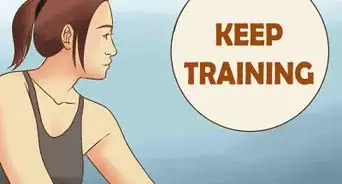

References
- ↑ https://www.unm.edu/~lkravitz/Article%20folder/stresscortisol.html
- ↑ https://health.clevelandclinic.org/eat-these-foods-to-reduce-stress-and-anxiety/
- ↑ https://medlineplus.gov/ency/patientinstructions/000892.htm
- ↑ https://health.clevelandclinic.org/eat-these-foods-to-reduce-stress-and-anxiety/
- ↑ https://www.beachbodyondemand.com/blog/how-to-get-rid-of-stress-belly
- ↑ https://www.ucsfhealth.org/education/increasing-fiber-intake
- ↑ https://health.clevelandclinic.org/alcohol-during-times-of-stress/
- ↑ https://medlineplus.gov/ency/patientinstructions/000889.htm
- ↑ https://www.beachbodyondemand.com/blog/how-to-get-rid-of-stress-belly
- ↑ https://www.apa.org/news/press/releases/stress/2013/sleep
- ↑ https://sleepeducation.org/healthy-sleep/healthy-sleep-habits/
- ↑ https://adaa.org/learn-from-us/from-the-experts/blog-posts/consumer/how-calm-anxious-stomach-brain-gut-connection
- ↑ https://www.onlymyhealth.com/health-slideshow/top-yoga-poses-to-reduce-belly-fat-1400673858.html
- ↑ https://www.mayoclinic.org/healthy-lifestyle/stress-management/in-depth/exercise-and-stress/art-20044469
- ↑ https://www.mayoclinic.org/documents/healthsource-pdf/doc-20079413
- ↑ https://blog.yeshealth.com/consumer/how-to-get-rid-of-stress-belly
- ↑ https://www.uofmhealth.org/health-library/uz2255
- ↑ https://adaa.org/learn-from-us/from-the-experts/blog-posts/consumer/how-calm-anxious-stomach-brain-gut-connection
- ↑ https://adaa.org/learn-from-us/from-the-experts/blog-posts/consumer/how-calm-anxious-stomach-brain-gut-connection
- ↑ https://adaa.org/learn-from-us/from-the-experts/blog-posts/consumer/how-calm-anxious-stomach-brain-gut-connection
- ↑ https://news.yale.edu/2000/09/22/study-stress-may-cause-excess-abdominal-fat-otherwise-slender-women
- ↑ https://adaa.org/learn-from-us/from-the-experts/blog-posts/consumer/how-calm-anxious-stomach-brain-gut-connection
- ↑ https://www.helpguide.org/articles/mental-health/cultivating-happiness.htm
- ↑ https://www.mayoclinic.org/healthy-lifestyle/stress-management/in-depth/decrease-stress-by-using-your-breath/art-20267197
- ↑ https://www.uchicagomedicine.org/forefront/gastrointestinal-articles/stress-and-stomach-pain-when-should-you-see-a-specialist
About This Article

